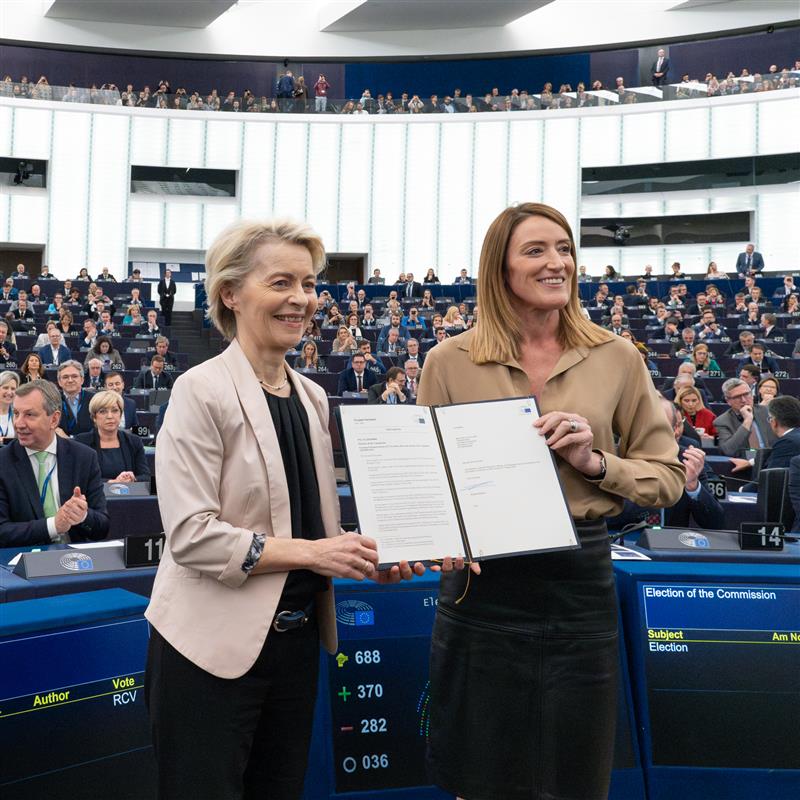The European Parliament approves the new European Commission led by Ursula von der Leyen and EU budget for 2025which includes more money for research. The budget was adopted by 418 votes to 185, with 67 abstentions. The Council had already approved the agreement on 25 November. 370 MEPs voted for the Commission, 282 against and 36 abstained.
After a debate with Ursula von der Leyen on her new team and programme, MEPs elect the College of Commissioners as a whole by roll-call vote.
A majority of the votes cast was required to confirm the College of Commissioners (Rule 129(7) of the EP Rules of Procedure).
This will be Ursula von der Leyen's second term as Commission President after MEPs approved her first Commission in November 2019.
Discussion with MEPs before the vote
Before the vote, Ursula von der Leyen presented her team and her programme, confirming the portfolio changes requested by MEPs during the evaluation process in Parliament. "We're ready to get to work immediately," said, stressing that her Commission will always be committed to the struggle for freedom, sovereignty, security and prosperity. You can read her speech on the Commission's website.
Ms von der Leyen announced that the Commission's first initiative will be a competitiveness compass to close Europe's innovation gap with the US and China, increase security and independence and achieve decarbonisation. On the European Green Deal, she said that "we must and will stay the course on her goals". It has committed to present a clean industry agreement, to launch a strategic dialogue on the future of the European automotive industry, to continue work on a competitive circular economy and to work towards a European Union of savings and investment.
On the ongoing wars in Ukraine, the Middle East and parts of Africa, Ms von der Leyen said that "Europe must play a stronger role in all these areas"and she stressed that it's "needed more than ever". Strengthening our security is essential, she said, calling on Europe to spend more on defence. "Europe's security will always be a priority for this Commission," She added.
In the ensuing debate, some MEPs stressed the need for the new Commission to quickly address the challenges facing Europe. They called on the Commission to improve European competitiveness in the face of growing global competition, to implement the European Green Deal, to ensure energy independence and to build a defence union in response to the ongoing war in Ukraine. Others have made clear their opposition to the new College of Commissioners. Recordings and extracts from the debate are available in Parliament's multimedia centre.
Following its formal appointment by the European Council, the new European Commission is expected to take up its duties by qualified majority on 1 December 2024.
The proposed College of Commissioners was examined by MEPs in specialised public hearings from 4 to 12 November. The candidates appeared before the European Parliament's committees for hearings to assess their suitability and ability to carry out the duties of the portfolios they have been assigned.
The Conference of Presidents of Parliament declared the hearings closed and published the evaluation letters of all the Commissioners-designate on 27 November. For more information on the Commission's investment process in 2024, see the brief report by the Parliamentary Research Service.
Results of previous votes:
November 2019 Ursula von der Leyen / 461 for, 157 against, 89 abstentions (751 seats in the EP)
October 2014 Jean-Claude Juncker / 423 - 209 - 67 (751 seats in the EP)
February 2010 José Manuel Barroso / 488 - 137 - 72 (736 MEPs)
November 2004 José Manuel Barroso / 478 - 84 - 98 (732 MEPs)
September 1999 Romano Prodi / 510 - 51 - 28 (626 seats in the EP)
January 1995 Jacques Santer / 417 - 104 - 59 (567 EP seats)
MEPs have secured more effective support for the EU budget for 2025 to tackle issues such as health, humanitarian aid, border management and climate action.
In an agreement with Member States reached on Saturday 16 November, Parliament succeeded in defending an ambitious EU budget for next year that tackles today's challenges and improves citizens' lives.
In February 2024, when the Parliament revised the EU's long-term budget, it secured a substantial increase in funding for key priorities such as support for Ukraine, and top-ups that MEPs managed to maintain for the 2025 budget. They also secured funding for the cost of repaying the European Recovery Instrument (EURI), which is almost double the amount originally foreseen for 2025, while protecting funding for core programmes such as Erasmus+ and research.
MEPs also secured additional funding for core programmes in the 2025 annual budget, successfully negotiating an additional €230.7 million over and above the Commission's initial proposal, focusing on key initiatives including research, health, education, young farmers, coordination of social security systems, response to natural disasters, climate action, humanitarian aid, military mobility and border management. In addition to these additional funds, the 2025 budget will benefit from significant increases coming from previous savings, including €422 million for Erasmus+ and €20 million for Horizon Europe.
The 2025 budget was adopted with 418 votes in favour, 185 against and 67 abstentions. The council approved the agreement earlier on November 25.
More than 90 % of the EU budget goes to fund activities in EU countries and beyond that benefit citizens, regions, farmers, researchers, students, NGOs and businesses. Unlike national budgets, the EU budget focuses primarily on investments to create growth and opportunities across the EU. The EU serves 27 countries with a total population of 450 million. Given this scale, the EU's annual budget is relatively small - on average €160-180 billion per year in 2021-27. This compares to the national budget of Denmark, which serves a population of 5.6 million, and is around 30 % less than the budget of Poland, with a population of 38 million.
EP/ gnews - RoZ



